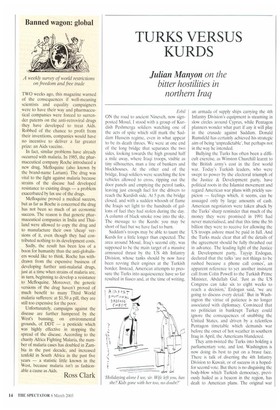Banned wagon: global
A weekly survey of world restrictions on freedom and free trade
TWO weeks ago, this magazine warned of the consequences if well-meaning scientists and equality campaigners were to have their way and pharmaceutical companies were forced to surrender patents on the anti-retroviral drugs they have developed to treat Aids. Robbed of the chance to profit from their inventions, companies would have no incentive to deliver a far greater prize: an Aids vaccine.
In fact, similar problems have already occurred with malaria. In 1985, the pharmaceutical company Roche introduced a new drug, Mefloquine (also known by the brand-name Lariam). The drug was vital to the fight against malaria because strains of the disease had developed resistance to existing drugs — a problem exacerbated by lax use of the drugs.
Mefloquine proved a medical success, but as far as Roche is concerned the drug has not been so much of an economic success. The reason is that generic pharmaceutical companies in India and Thailand were allowed to copy the drug and to manufacture their own 'cheap' versions of it, even though they had contributed nothing to its development costs.
Sadly, the result has been less of a boon for humanity than the anti-globalisers would like to think. Roche has withdrawn from the expensive business of developing further anti-malarial drugs, just at a time when strains of malaria are, in turn, beginning to develop a resistance to Mefloquine. Moreover, the generic versions of the drug haven't proved of much benefit to many Third World malaria sufferers: at $1.50 a pill, they are still too expensive for the poor.
Unfortunately, campaigns against the disease are further hampered by the West's banning, on environmental grounds, of DDT — a pesticide which was highly effective in stopping the spread of the disease. According to the charity Africa Fighting Malaria, the number of malaria cases has doubled in Zambia in the past decade, and increased tenfold in South Africa in the past five years — a statistic little known in the West, because malaria isn't as fashionable a cause as Aids.
Ross Clark


































































 Previous page
Previous page